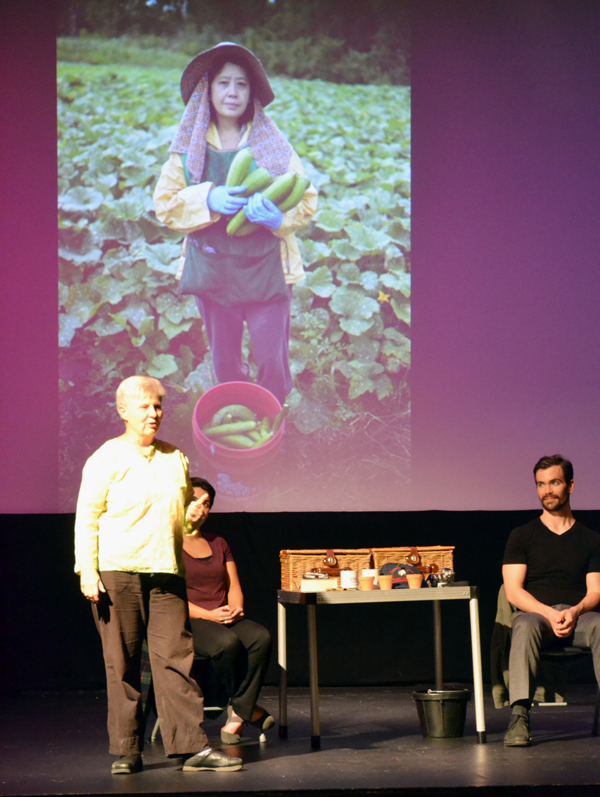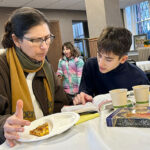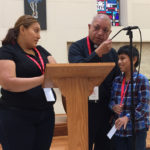By Barb Arland-Fye
The Catholic Messenger
Photographs of recent immigrant farmers flashed on the wall behind an actor and actress portraying real-life immigrants who found refuge and a good life in Iowa. The play “Vang,” which means garden or farm in Hmong, riveted the attention of audiences in DeWitt and Davenport because the storytelling evoked the pain, loss and perseverance of ordinary people.
Our Lady of the Prairie Retreat sponsored the performances. The Sisters of St. Francis-Clinton co-sponsored the Sept. 14 showing at the DeWitt Opera House Theatre and the School Sisters of Notre Dame co-sponsored the Sept. 15 showing at the Humility of Mary Center in Davenport.

Playwright Mary Swander talks about the play ‘Vang’ that highlights immigrant farmers in Iowa. It was performed in DeWitt and Davenport on Sept. 14 and 15.
Playwright Mary Swander’s website states that “The public often thinks of farmers as white males of European ancestry living in isolated rural areas. And the public often thinks of immigrants as those who have slipped into the United States to take advantage of assistance programs. Vang blows away both of those stereotypes and opens discussion about how farming is done in the United States and how immigrants have become part of the larger agricultural picture.”
The four stories shared in this play feature refugees and immigrants, each connected to the soil in some way. Pulitzer Prize-winning photograph Dennis Chamberlain’s images of the four couples as a backdrop to the performance provide a sense of accompaniment.
First, the audience meets Toua and A Vang, a Hmong couple who fled Laos with family because the communists were bent on revenge against Hmongs for aiding U.S. soldiers during the Vietnam War. The family endured horrific challenges and loss during their exodus. Toua’s mother, wounded during their flight, sacrificed her life for her starving family by testing nuts that turned out to be poisonous.
In Iowa, Toua became a tailor, but he and his wife also tend their garden. “We go into the garden to relax our minds,” A said. “The plant grows good, so you feel good,” her husband added. Earning just $17,000 a year to support their family, they set aside $7,000 annually to help other refugee families. “We really live the American dream,” the Vangs said.
Sudanese refugee Joseph Malual described being thrown into a cramped prison cell in an Ethiopian refugee camp. To survive, the prisoners took turns lying on the floor to breathe air coming in from the space beneath the cell door. Upon immigrating to Iowa, Malual worked in a meat packing plant, while completing a doctorate in sustainable agriculture. “Growing things, it gives me a spiritual feeling,” he said. “Farming in America connects me to the life in the camp and to the life all the way back.” He and his wife, Haime, and their family now live in Wisconsin where he works for the University of Wisconsin-Extension service.
Ramona and Beni Chavez Lopez, subjects of the third story, worked in the meat-packing plant industry in Marshalltown. Ramona became an activist, championing the rights of the oppressed. She learned English by looking up words (which turned out to be profanity) that her boss yelled at her. Ramona and Beni also tend to their large organic garden. “We give a lot away, to Anglos and Hispanics,” Ramona said.
The fourth story features Dutch dairy farmers Dorrine and Jan Boelen who settled in Brooklyn, Iowa, with their five children. They were displaced by an environmental project in their homeland. One of their sons, Geert, now 21, was in the audience for the Vang performance at the Humility of Mary Center.
Swander, who is Iowa’s poet laureate, was explaining to the audience how she had written 250 pages, single-space typed from interviews with dozens of immigrants. Geert quipped, “How many of those pages were my mom’s?”
His family began their dairy farm in Brooklyn milking 130 cows. Today they’re milking 1,300. After seeing the play, he planned to head home to help out on the farm. During weekdays, he’s studying ag business as a senior at Iowa State University.
His friend, Rebecca Lyons, an Iowa State University student from Clinton, alerted him about the play after her parents saw the performance in DeWitt. Their families knew each other because the Lyons had sold milk cows to the Boelens. “The play was emotional and insightful,” said Marlys Lyons, Rebecca’s mom. Geert agreed. “They put a lot of emotion into it.” “It was interesting to get to see the different viewpoints of the different people,” Rebecca said. She appreciated the common thread woven through the play: families searching for and finding a good life.
Sister Kathleen Storms, director of Our Lady of the Prairie, observed: “The Prairie looks for opportunities to offer programs that address pressing issues and needs. Vang is a story that puts skin on rural people of Iowa.”
DeWitt performance impresses deacon
Deacon Mark Comer of St. Joseph Parish in DeWitt, helped promote the performance of “Vang” in his community. Pat Sheil, the parish’s director of religious education, organized a dinner of pulled pork sandwiches, fresh veggies and salads served before the Sept. 14 performance at the DeWitt Opera House Theatre. “We were delighted with the turnout in DeWitt,” Sheil said.
Reflecting on the performance, Deacon Comer said: “I appreciated that the play wasn’t overdone, over-dramatized; the realness of the stories, and the immigrants and their pains and losses, which were presented and left for the viewer to digest.
“We cannot love our sisters and brothers without knowing them and we cannot know them by focusing only on our perceived differences, what separates us. Empathy demands effort and in this play the writer vividly displays the effort expended as she reached out to learn about others. We are presented an opportunity to exercise and strengthen our own empathy,” he continued.
Playwright Mary Swander “searched for people from the other side of the world in her own neighborhood, people hiding in plain sight, explaining that the stories are all from people living within a 70-mile range of her home in Iowa. We don’t need to travel that far or work that hard to come to know our sisters and brothers, to exercise our empathy for others. If we desire to grow, we do well to expend effort, to desire to learn about our neighbors near and far.”
For booking information about “Vang,” contact Mary Swander at mswander@iastate.edu.












Sisters,
Thank you for helping put the immigrant stories out for the public to hear and feel. Just more of your good work. I’m proud.
Thank you very much!